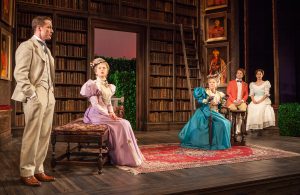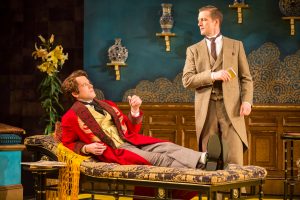Wit Served As Old Globe Again Goes Wilde
The last time the Old Globe Theatre presented The Importance of Being Earnest, in the summer of 1982, the brilliant actor-director Ellis Rabb donned drag to play the central role of Lady Bracknell.
His flamboyant curtsey for the curtain-call almost filled the entire forestage with rippling crinoline and gabardine.
The Globe’s new production of Oscar Wilde’s masterpiece contains no such single elaborate indulgence but instead gleams and glistens with some of the most polished, enduring wit in the English language, dispensed by an intense cast under the supervision of a serene veteran, the West End actress and busy trans-Atlantic director and teacher, Maria Aitken.
The intensity observes a paramount rule of English comedy as promulgated by the great William S. Gilbert of Gilbert and Sullivan fame:
“It is absolutely essential … that it should be played with the most perfect earnestness and gravity … The characters, one and all, should appear to believe, throughout, in the perfect sincerity of their words and actions. Directly the actors show that they are conscious of the absurdity of the utterances the piece begins to drag.”
It is a doctrine very much the core of Wilde’s comic muse. (See his other mask for Salome.) And, when installed by an expert such as Miss Aitken, it pretty much guarantees a blissful theatrical occasion.
Gilbert not only inspired Wilde but he also was inspired by Wilde, to write one of the most winsome of the G&S operas, Patience, in which a languorous youth strikes faux medieval poses very much in the style of Wilde’s notorious eccentricities. (Richard D’Oyly Carte, producer of the G&S team, famously sent Wilde to America on a lecture tour prior to the U.S. premiere of Patience. He was booked for a couple of months but was extended for the entire year of 1882.)

Matt Schwader, Kate Abbruzzese, Helen Carey, Christian Conn and Helen Cespedes in The Importance of Being Earnest at the Old Globe Theatre. Jim Cox Photo
Earnest is the one about the two London gentlemen of leisure – Jack and Algernon – who woo nubile maidens – Cecily and Gwendolen – whilst covering up their more colorful cavorts with the disguise name, “Ernest.” Everybody is more or less related, ranging from penniless to very wealthy, and all of them turn out to be quite socially acceptable. (“Never speak disrespectfully of Society,” warns Gwendolen’s mother, Lady Bracknell. “Only people who can’t get into it do that.”)
The happy ending is a foregone conclusion; I feel ridiculous avoiding spoilers. This is a familiar play very much embedded in the English-speaking theatre: In Neil Simon’s 1965 Broadway comedy The Odd Couple, two newly-minted bachelors invite to dinner the delectable Pigeon sisters from upstairs, Gwendolyn and Cecily.
One tingles with anticipation not so much at what comes next as how it comes.
The very peak of stylish mannerism comes, I think, in the sculptured gaze of Kate Abbruzzese’s Gwendolyn: Down her long nose, over her rigid and tilted chin to laser into her target. But that’s her. Helen Cespedes’ Cecily is softer and more rustic but not one bit less formidable. As long as their agendas mesh, they will rule the future of English fashion.
Early on, Matt Schwader seems too precise and apprehensive as Jack, Cecily’s guardian and Gwendolyn’s suitor, but the tightness pays off when he must clash with Lady Bracknell over her daughter’s future. Tantalized by a sudden possibility of solving his life’s complex mysteries, he explodes into frantic action, a nice startler.

Christian Conn, reclining, and Matt Schwader in The Importance of Being Earnest at the Old Globe. Jim Cox Photo
Christian Conn, on the other hand, gets to wallow in the autobiographical role. His eyebrows get a workout. His wrists suggest limpness rather than affecting it. Even his hair flops expertly into the famous photo-images of Wilde’s. And he gets so many of the best lines: “The truth is rarely pure and never simple.” “Her hair,” speaking of a newly widowed, still youngish lady, “has turned quite gold with grief.”
(And I just can’t resist Algernon’s lofty Oxfordian put-down of my colleagues: “Literary criticism is not my forte, my dear fellow. Don’t try it. You should leave that to people who haven’t been to a University. They do it so well in the daily papers.”)
As Lady Bracknell, Helen Carey holds high and steady the banner of useless aristocracy, never hinting at anything short of absolute certainty. She executes the verbal version of the tight choreography Miss Aitken has installed into the movement of the actors, a source of endless refreshment.
Jane Ridley’s Miss Prism is the primly passionate veteran governess required; Rodney Gardiner putters properly as the country clergyman; and Daniel Harray is splendid as a practiced valet to the exquisite Algernon.
There are no quibbles over Fabio Toblini’s costumes, even though he takes a few chances, but Hugh Landwehr is not so successful with the sets, which tend to exaggerate in the service of the playful. And, alas, what happened to the main act drop, which seems to have been left just in the sketched step? Philip S. Rosenberg’s lighting behaves properly indoor and out and Fitz Patton’s incidental music (including his droll salute to G&S) is sprightly and attuned to the purr of the project.
(Continues on the Shiley Stage at 7 p.m. Tuesdays, Wednesdays and Sundays, at 8 p.m. Thursdays-Saturdays; and at 2 p.m. Saturdays and Sundays through March 4, 2018.)

Welton Jones has been following entertainment and the arts around for years, writing about them. Thirty-five of those years were spent at the UNION-TRIBUNE, the last decade was with SANDIEGO.COM.


